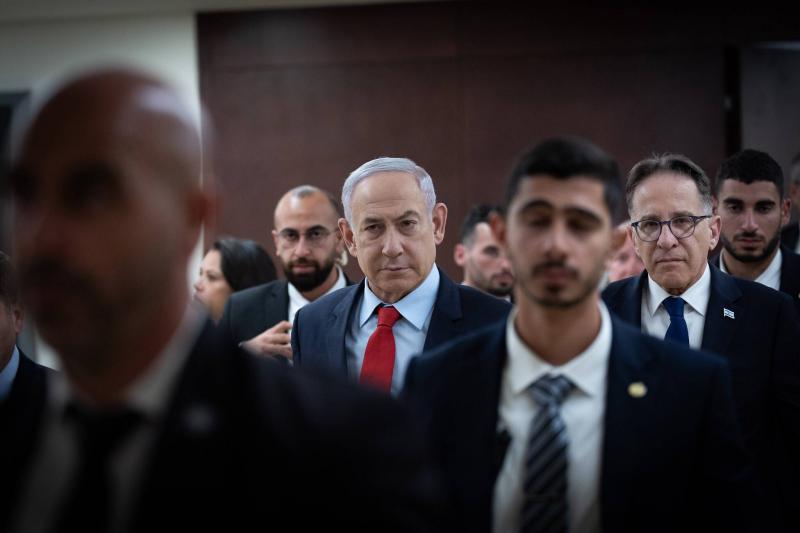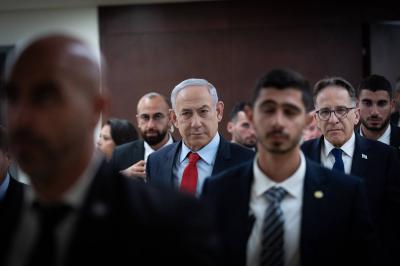Escalating protests, calls for massive demonstrations, and demands for early elections amidst "internal coalition disagreements" present multiple challenges for Israeli Prime Minister Benjamin Netanyahu, raising questions about the possibility of "his government’s fall and his departure from power." Israeli political analyst Shlomo Ganor explains that the current protests have "united different opinions and goals" related to "advancing the election date, imposing mandatory military service on all segments of Israeli society, and addressing families of the abducted individuals for their return."
The ongoing mass protests serve as a "display of strength," as participants have unified for the first time to demand Netanyahu take responsibility. Organizers of the demonstrations may set up a "tent city" to stay overnight and protest in front of the Knesset. On Sunday, tens of thousands of Israelis demonstrated to denounce Netanyahu’s government and the exemptions given to some Jews from military service, as well as to call for reinforcing efforts to release hostages held in Gaza.
On the second consecutive night of massive protests, thousands of Israelis rallied to demand "the government’s resignation and Netanyahu’s departure, early elections in Israel, and the approval of a prisoner swap deal that could lead to the release of 130 hostages held in Gaza since the October 7 attack," according to the Times of Israel. On Saturday, thousands gathered in Israel’s largest city, Tel Aviv, blocking the main highway for nearly two hours, while others staged sit-ins outside Netanyahu's home in Jerusalem, chanting for his resignation. Many protesters carried signs depicting Netanyahu’s face smeared with blood, accusing him of failing to protect the country from Hamas, designated as a terrorist organization in the U.S. and other countries. The slogans on protesters' signs included "You are the leader, you are responsible" and "Elections now."
The demonstration in Jerusalem was described by organizers as the largest since the war in Gaza erupted on October 7, with reports from Haaretz and Ynet News indicating that tens of thousands participated. Pressure on Netanyahu is increasing as his opponents and the families of hostages held in Gaza have found a "common cause." The families have stated that they will take to the streets every night this week in an effort to "bring them home."
Israeli political analyst Hanan Miller notes that public sentiment in Israel is rallying around the "current protests and demonstrations," although there is a "reaction" from right-wing factions that oppose them. Polls reveal that "the popularity of the center is rising while the popularity of the far-right is declining in the Israeli street," he said. However, on the other hand, political analyst Mordechai Kedar asserts that "the protests consist of a handful of political opponents to the right," and that "most people" are not participating as it harms society, the state, and the army. He describes the protesters as "a handful of people who have lost their brakes" and insists that the protests "are overrated and have very little impact on the ground."
Ganor points out that the number of participants in the current protests "cannot be compared" to demonstrations against controversial "judicial amendments." Despite multiple objectives, there is no "widespread enthusiasm" from the public to unite under a single banner with various goals, as people desire stability and do not share the same eagerness to protest as in previous instances, according to the political analyst. Therefore, from the perspective of the Israeli street, demonstrations and protests "are not the solution" for changing the government, Ganor explains.
**Early Elections?**
In his speech to the demonstrators, Israeli opposition leader Yair Lapid claimed that all Netanyahu cares about is staying in power, accusing the Prime Minister of focusing on keeping his coalition partners happy rather than assisting citizens affected by the war, and called for "early elections." In contrast, Netanyahu stated at a press conference in Jerusalem that holding elections in the midst of a war that Israel is on the brink of winning would "paralyze the country for several months." Ganor clarifies that public opinion polls indicate a desire among the Israeli public for a change in "the style, direction, and personalities in the government," but the current governing coalition "is not giving in to holding elections."
The far-right parties in the current coalition "do not want early elections," as the current government is "the best for them in history," according to the Israeli political analyst. The Israeli public will not fall into the trap again and give the far-right the opportunity to lead Israel into the disastrous situation it currently faces, with the far-right "not willing to miss this current opportunity," Ganor adds. Furthermore, Kedar notes that "holding early elections requires approval from the Knesset by a majority vote." He emphasizes the possibility of "early elections," and that a government change is possible if there is a majority in the Knesset.
**Will the Coalition Collapse?**
Ultra-Orthodox Jews ("Haredim") make up 13% of Israel’s population, and military exemptions date back to the early days of the Israeli state when David Ben-Gurion, the country’s founder, granted exemptions to 400 religious students of military age in 1949. Forming a government requires the support of at least 61 members of the Knesset, and Netanyahu’s camp holds 64 seats, with Haredi political parties being key members of successive Netanyahu governments. Ganor asserts that the far-right parties are "displeased with Netanyahu," holding him responsible for the "failure of judicial reform and not succeeding in exempting religious students from mandatory service."
Despite "government coalition disputes," everyone "does not want to give up their position or seat," as noted by the Israeli political analyst. Miller illustrates that "recruiting Haredim" has stirred unrest within the Likud party and the government coalition, hence some members may split from the party and support a change in government. However, Kedar believes there is "no better government than the current one," and as long as the coalition holds 64 out of 120 Knesset members, it remains "solid and will continue until the end of the government’s term," despite disagreements regarding "Haredi recruitment."
**Will Netanyahu's Government Fall?**
Miller suggests that Netanyahu’s government is "very fragile and could soon collapse under mounting pressures from various parties." The "Knesset may be dissolved" leading to general elections if parliamentary members resign and vote to withdraw confidence from the Knesset, according to the Israeli political analyst. He discusses the possibility of "one of the opposition members gathering signatures from the coalition to gain a majority, thus able to change the Prime Minister and form an alternative government supported by the Knesset."
A replacement for Netanyahu could be chosen soon "even if it comes from the far-right." Kedar confirms, however, that it is "difficult for Netanyahu's government to fall," and that this would only happen if some coalition members defect and vote with the opposition to end the current Knesset term and go to elections. He assesses that the weakest link in the coalition is "the right-wing parties," and the exit of figures such as Finance Minister Bezalel Smotrich and National Security Minister Itamar Ben-Gvir could "break the coalition's back."
Ganor points out that the current government coalition relies on 64 votes, plus votes from Benny Gantz's "National Unity" party. The hostage deal in Gaza will test the "sturdiness of the government coalition," potentially leading to its fall by "dissolving the Knesset" through majority votes and holding elections ahead of the legal schedule, according to Ganor. The political analyst notes that achieving this requires "a majority in the Knesset," which currently does not exist, as the government coalition holds the "majority," he adds.
Certain "political, security, economic, and social circumstances might arise soon, ensuring the surprising majority that guarantees the government's fall," according to Ganor’s estimates. Netanyahu might resign without holding elections and appoint a member from Likud to form a "new government," but this would not be a viable escape, as the public would revolt against that coalition. The Israeli political analyst considers that "all scenarios and projections are on the table."
Israel is determined to carry out a military operation in Rafah despite international warnings. The coalition is in "danger" — will Netanyahu be ousted? An updated U.S. intelligence assessment has raised doubts about whether Israeli Prime Minister Benjamin Netanyahu will remain in power, amid warnings of the "danger surrounding the right-wing coalition" in Israel, while protests have also reignited in the streets.




